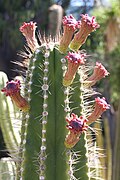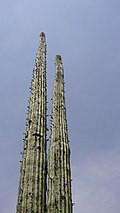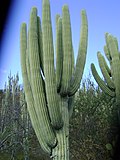Cephalocereus
| Cephalocereus | |
|---|---|

| |
| Cephalocereus senilis | |
| Scientific classification | |
| Kingdom: | Plantae |
| Clade: | Tracheophytes |
| Clade: | Angiosperms |
| Clade: | Eudicots |
| Order: | Caryophyllales |
| Family: | Cactaceae |
| Subfamily: | Cactoideae |
| Tribe: | Echinocereeae |
| Genus: | Cephalocereus Pfeiff.[1] |
| Type species | |
| Cephalocereus senilis | |
| Species | |
| Synonyms[1] | |
| |
Cephalocereus is a genus of slow-growing, columnar-shaped, blue-green cacti. The genus is native to Mexico.
Description
These cacti show a columnar and upright growth habit, and may be branched or unbranched reaching heights of 10 to 12 meters. The light green shoots, which turn gray with age, have a diameter of up to 40 centimeters and are almost completely covered by dense thorns near the top. On the 12 to 30 (or more) vertical ribs are closely spaced dimorphic areoles. The up to 5 central spines are yellowish to gray and up to 4 centimeters long. The numerous, bristly or hair-like radial spines usually enclose the shoot tightly. The flowers are medium-sized, tubular to bell-shaped, borne in a woolly structure called cephalium which can appear apically or laterally and open at night. The flower cup and the flower tube are covered with small scales.
The fruits are ovoid with small scales, and woolly. The smooth, pear-shaped seeds are black.[2]
Taxonomy
The genus Cephalocereus was established in 1838 by Ludwig Karl Georg Pfeiffer.[1]
Species
As of October 2023, Plants of the World Online accepted the following species:[1]
| Image | Scientific name | Distribution |
|---|---|---|
| Cephalocereus apicicephalium E.Y.Dawson | Mexico (Oaxaca) | |
 |
Cephalocereus columna-trajani (Karw. ex Pfeiff.) K.Schum. | Mexico (Oaxaca and Puebla) |
 |
Cephalocereus euphorbioides (Haw.) Britton & Rose | Mexico (Tamaulipas, Veracruz) |
 |
Cephalocereus fulviceps (F.A.C.Weber ex K.Schum.) H.E.Moore | Mexico (Puebla, Oaxaca) |
 |
Cephalocereus macrocephalus F.A.C.Weber ex K.Schum. | Mexico (Puebla, Oaxaca) |
 |
Cephalocereus mezcalaensis Bravo | Mexico (Colima, Guerrero, Jalisco, México State, Michoacán, Morelos, Oaxaca, Puebla, Tlaxcala) |
| Cephalocereus nudus E.Y.Dawson | Mexico | |
| Cephalocereus parvispinus S.Arias, H.J.Tapia & U.Guzmán | Mexico (Oaxaca) | |
 |
Cephalocereus polylophus (DC.) Britton & Rose | Mexico (Guanajuato to Veracruz) |
| Cephalocereus sanchezmejoradae (A.B.Lau) H.J.Tapia & S.Arias | Mexico (Oaxaca). | |
 |
Cephalocereus scoparius (Poselg.) Britton & Rose | Mexico (Veracruz, Oaxaca) |
 |
Cephalocereus senilis (Haw.) Pfeiff. | Mexico (Hidalgo and Veracruz ) |
 |
Cephalocereus tetetzo (F.A.C.Weber ex J.M.Coult.) Diguet | Mexico (Oaxaca and Puebla) |
Distribution and habitat
This genus of cacti is native to central and southern Mexico. Its habitat is desert scrub in the Central Mexican matorral and Southern Pacific dry forests.[citation needed]
References
- ^ a b c d "Cephalocereus Pfeiff." Plants of the World Online. Royal Botanic Gardens, Kew. Retrieved 2023-10-30.
- ^ Anderson, Edward F.; Eggli, Urs (2005). Das grosse Kakteen-Lexikon (in German). Stuttgart (Hohenheim): Ulmer. pp. 99–101. ISBN 3-8001-4573-1.
External links
- (in French) photos on www.AIAPS.org
- (in English) photos on www.cactiguide.com
- GBIF entry
